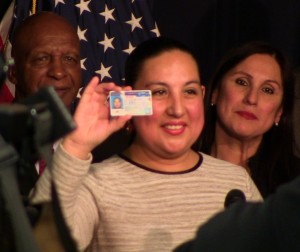 Catholic Conference of Illinois Executive Director Robert Gilligan today joined with state officials and advocates in applauding a new policy that eliminates the need for advance appointments for undocumented immigrants to apply for Temporary Visitor Driver's Licenses.
Catholic Conference of Illinois Executive Director Robert Gilligan today joined with state officials and advocates in applauding a new policy that eliminates the need for advance appointments for undocumented immigrants to apply for Temporary Visitor Driver's Licenses.
Starting July 1, all Illinois Secretary of State facilities except for Chicago North and Chicago West will process TVDL applications without an appointment.
Gilligan noted the licenses allow undocumented immigrants to get to church, doctor's appointments and work without the fear of being deported if stopped for a minor traffic violation. He underscored the importance of getting safely to work in the Illinois bishops' decision to support the 2013 legislation extending TVDLs to immigrants.
"Work is a form of dignity," Gilligan said at a Chicago press conference. "It's a way to live out who we are to make ourselves valuable to the community."
The licenses are similar in appearance to regular Illinois driver's licenses, but have a purple color scheme instead of red, and are clearly marked "Not valid for Identification." They can only be used for driving, and not for identification — such as for voting, boarding an airplane or buying a firearm. They are good for only three years.
To qualify for a TVDL, undocumented immigrants must prove they are ineligible for a Social Security Number, and have lived in Illinois for at least one year. Documents that are accepted include a valid passport or consular identification card, and a copy of a lease or utility bills.
Applicants must pass vision, written and road tests, pay a $30 fee, and purchase auto insurance. If an individual is caught driving without insurance, they will be ticketed for that infraction, and the TVDL will become invalid, leading to another ticket for driving without a license.
 So far, 181,000 undocumented immigrants in Illinois have been licensed and insured under the TVDL provision.
So far, 181,000 undocumented immigrants in Illinois have been licensed and insured under the TVDL provision.
Esperanza Villalobos, a leader with the Chicago-based Resurrection Project, told attendees at the press conference that her fear of being stopped by the police haunted her when driving to get treatment for cancer three years ago.
"I was more afraid of being detained by the police and separated from my children than the results of my cancer treatment," she said.
